Edie Melson's Blog, page 191
August 14, 2020
Being Honest About Our Emotions Can Bring Freedom and Enhance Writing

by Emme Gannon @GannonEmme
We are in crises. We’re asked to protect our bodies and those of our fellow citizens by barricading ourselves in our homes, denying ourselves touch and interaction with others, both family and friends. This is not meant as a political statement or an attack on restrictions placed on us by the authorities. It is a fact that cannot be denied. Right now, this is our world.This unnatural state we find ourselves in goes against the very core of our being. We are a people created by God with three distinct parts, body, soul, and spirit. While separate, they depend on one another for our health and well-being. When the body hurts so does our soul (our emotions, thoughts.) When our spirit grieves, we feel the pain in our soul and often in our body. Leading medical experts estimate that 90% of disease is caused or complicated by stress. Stress drains the body of positive energy as it strives to cope with the demanding worry of stress-related issues, leaving less energy to sustain immune function that heal illnesses and injuries. How can we meet the needs of our soul and spirit while still protecting ourselves and others from physical harm?
After reaching out to those known to me and those known to others in my small world, I share a few stories of how some are coping. First we go to a small New England town, where a friend sprang into action. After observing the despair of her town’s merchants who were forced to close their businesses and were struggling to feed their families, the woman decided to organize a street fair. She made certain that restaurants and businesses complied with the rules of her state. She got permission from the town officials. Main Street was closed and attendance was limited so as to comply with social distancing. The merchants were encouraged to set up tables and display their merchandise outside their shops. She shared with me that she could feel the dark spirit lift as people did what they were created by God to do—work and bless others. They encouraged. They laughed. Their soul was fed by life-giving fellowship.
Days after the fair, a widow in her 80’s could be found sitting outside the local food pantry in the heat from ten in the morning to four in the afternoon. “Why don’t you go inside,” my friend asked. “Because the room inside is small and would not accommodate social distancing,” the woman said, “So, I sit outside each day so that those who are hungry can come for food.” This woman is an example that the spirit lifted knows no bounds.
Our next story takes us to a coastal town in North Carolina where a war-torn vet with PTSD struggles with the restrictions placed upon the residents there. His world is disjointed. His support system gone. He stays in his tiny home in the company of his therapy dog. His soul is weary. The silence screams at him. There is no today. Only yesterday. And yesterday explodes upon him with memories of war and despair. Then something happened. A neighbor mowed his lawn and deposited a dozen eggs on his door step. Nothing said. Just a silent show of support that pushed the past away and brought light and hope into his today.
Our third story takes us to the suburbs of a city in the south where a woman weary of being alone contacted members of her church and invited them to meet under her large maple tree once a week and study one of the Psalms. Five woman appeared. Each week, the Lord withheld rain. They gather and unlock their feelings. And then, they read the Psalm of the week and get God’s perspective. Hope invades. Prayers unite. God reigns and reminds that He is in control. “Fear not for I am with you.”
There’s a story that we’re meant to be a part of. A story we may be robbed of because an unseen enemy is holding us captive and not allowing us access to the life we were made for. How does that make us feel? Let our reaction to that question stir around in our psyche for a little bit and then ask God what He has in mind. We may be surprised. Whatever it is, know that it is mighty. Even if it is dropping off eggs on the doorstep of a wounded vet. Or encouraging an elderly widow. Or opening up to others under a tree in your backyard.
What does all of this have to do with writing? Everything. For the stories we write spring from our soul and our spirit. When they soar, so does our writing.
TWEETABLEBeing Honest About Our Emotions Can Bring Freedom and Enhance Writing - @GannonEmme on @EdieMelson (Click to Tweet)
 Emme Gannon is a wife, mother, and grandmother who loves to write stories that stir the heart. Her award-winning writing has appeared in Focus on the Family magazine, several anthologies, and numerous newsletters. She just completed her first novel.
Emme Gannon is a wife, mother, and grandmother who loves to write stories that stir the heart. Her award-winning writing has appeared in Focus on the Family magazine, several anthologies, and numerous newsletters. She just completed her first novel.
Published on August 14, 2020 22:00
August 13, 2020
Seizing the Day as a Writer in Times of Chaos
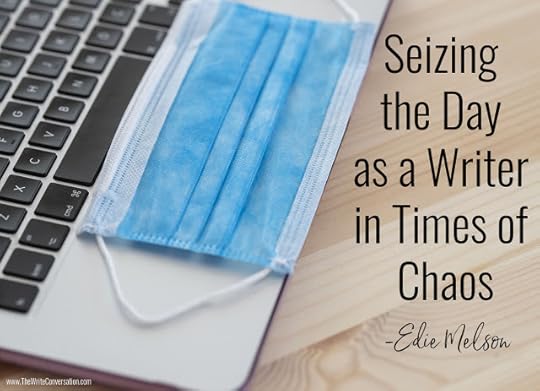
by Edie Melson @EdieMelson
If 2020 has taught us anything, it’s that life can change in an instant. I thought I knew that, but now it’s something I’m hyper aware of, and it’s affected the way I do life, writing life and all the rest as well. At the beginning of all this craziness, I ascribed to the hunker-down-and-wait mentality.
I couldn’t seem to motivate myself to creativity—or much of anything else. I overdosed on news and Netflix. It made my mind and body sluggish and my mood plummeted.
My life was passive as I was waiting for things to settle and a pattern to emerge.
I had become like a certain type of heroine whom I despise. One who just waits to be rescued and lets everyone else have fun sword fighting and saving the day. Not really a picture I’m proud of.
Luckily God finally got my attention and He whispered some fairly significant truths. I never was in control to begin with and this time is a reminder of that fact. For the Lord of hosts has purposed, and who will annul it? His hand is stretched out, and who will turn it back? Isaiah 14:27I was never promised a clear path with predictable outcomes. When you go through deep waters, I will be with you, When you go through rivers of difficulty, you will not drown. When you walk through the fire of oppression, you will not be burned up; the flames will not consume you. Isaiah 43:2I have been given certain gifts, situations, and communities—as well as jobs to do within them. I was never promised a specific set of circumstances with which to follow my calling. For we are his workmanship, created in Christ Jesus for good works, which God prepared beforehand, that we should walk in them. Ephesians 2:10Life is finite and I must make the most of the time I’m given. Yet you do not know what tomorrow will bring. What is your life? For you are a mist that appears for a little time and then vanishes. James 4:14God loves me and He’s never lost control. None of the craziness of life—now or later—can shake Him from the purposes He’s ordained. No, in all these things we are more than conquerors through him who loved us. For I am sure that neither death nor life, nor angels nor rulers, nor things present nor things to come, nor powers, nor height nor depth, nor anything else in all creation, will be able to separate us from the love of God in Christ Jesus our Lord. Romans 8:37-39
Yeah.
That last one.
God IS still in control.
I don’t get a free pass from life just because things are difficult and different.
Instead these are the place where I need to focus.Draw closer to God through prayer, Bible study, worship and praise. But for me it is good to be near God; I have made the Lord God my refuge, that I may tell of all your works. Psalm 73:28Exercise my gift. God has a purpose for the gifts he’s given each of us. And He wants to use our gifts to change the world. But if I’m not using them, He’ll move on and use someone. As each has received a gift, use it to serve one another, as good stewards of God's varied grace: 1 Peter 4:10Love the people God has placed in my path. To me that means more than friends and family, it means I must truly love—the difficult kind of love—those on the news who anger me, the driver who cuts me off, the grocery clerk who’s exhausted and needs a kind word. Above all, keep loving one another earnestly, since love covers a multitude of sins. 1 Peter 4:8Remember that God isn’t finished. And I am certain that God, who began the good work within you, will continue his work until it is finally finished on the day when Christ Jesus returns. Philippians 1:6
So where does this leave me as a writer in difficult times? Exactly the same place I was a writer in easier times. And that's an important truth I'm just now embracing. My calling and my purpose haven't changed even if the world around me has. It's time to seize the day and be about the business of writing.
What about you? How are moving on with your purpose in spite of the crazy world around us.
TWEETABLESeizing the Day as a Writer in Times of Chaos - @EdieMelson (Click to Tweet)
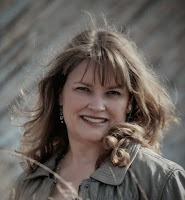 Edie Melson is a woman of faith with ink-stained fingers observing life through the lens of her camera. No matter whether she’s talking to writers, entrepreneurs, or readers, her first advice is always “Find your voice, live your story.” As an author, blogger, and speaker she’s encouraged and challenged audiences across the country and around the world. Her numerous books reflect her passion to help others develop the strength of their God-given gifts and apply them to their lives.Connect with her on her website, through Facebook, Twitter and on Instagram.
Edie Melson is a woman of faith with ink-stained fingers observing life through the lens of her camera. No matter whether she’s talking to writers, entrepreneurs, or readers, her first advice is always “Find your voice, live your story.” As an author, blogger, and speaker she’s encouraged and challenged audiences across the country and around the world. Her numerous books reflect her passion to help others develop the strength of their God-given gifts and apply them to their lives.Connect with her on her website, through Facebook, Twitter and on Instagram.
Published on August 13, 2020 22:00
August 12, 2020
Praying God’s Word over Your Words –Prayers for the Writing Journey

By Julie Lavender @JLavenderWrites
The Bible is filled with prayers from notablel giants like Paul, David, Moses, Aaron, Jabez, Ezra, and others. The New Testament records Jesus’ prayers, too.
Throughout the years, I’ve enjoyed voicing many of those same prayers for different aspects of my writing journey.Below are a few of my favorites.
When I need direction in my writing: Show me the right path, O Lord; point out the road for me to follow. Lead me by your truth and teach me, for you are the God who saves me. All day long I put my hope in you. Psalm 25:4-5 NLTGive me understanding and I will obey your instructions; I will put them into practice with all my heart. Make me walk along the path of your commands, for that is where my happiness is found. Psalm 119:34-35 NLTTeach me your way, O Lord, that I may walk in your truth; unite my heart to fear your name. Psalm 86:11 ESVSince you are my rock and my fortress, for the sake of your name lead and guide me. Psalm 31:3 NIV
When rejections and discouraging times come:My soul melts from heaviness; strengthen me according to Your word. Psalm 119:28 NKJVListen to my prayer, O God. Do not ignore my plea; hear me and answer me. My thoughts trouble me and I am distraught. Psalm 55:1-2 NIV God, be merciful to me, a sinner. Luke 18:13 ESVPurify me with hyssop, and I shall be clean; wash me, and I shall be whiter than snow. Let me hear joy and gladness; let the bones that you have broken rejoice. Hide your face from my sins, and blot out all my iniquities. Create in me a clean heart, O God, and renew a right spirit within me. Psalm 51:7-10 ESV
When seeking favor for my writing: Oh that you would bless me and enlarge my border, and that your hand might be with me, and that you would keep me from harm so that it might not bring me pain. 1 Chronicles 4:10 ESVAnd now, Lord, take note of their threats, and grant that your bond-servants may speak your word with all confidence. Acts 4:29 NASBIf it is true that you look favorably on me, let me know your ways so I may understand you more fully and continue to enjoy your favor. Exodus 33:13 NLTFor thou art the glory of their strength: and in thy favour our horn shall be exalted. Psalm 89:17 KJV
Before, during, and after my writing: You turned my wailing into dancing; you removed my sackcloth and clothed me with joy, that my heart may sing your praises and not be silent. Lord my God, I will praise you forever. Psalm 30:11-12 NIVAnd now we thank you, our God, and praise your glorious name. 1 Chronicles 29:13 ESVHow I rejoice in the Lord! How he has blessed me! Now I have an answer for my enemies, For the Lord has solved my problem. How I rejoice! No one is as holy as the Lord! There is no other God, Nor any Rock like our God. 1 Samuel 2:1-2 TLBI will exalt you, my God the King; I will praise your name for ever and ever. Psalm 145:1 NIV
Do you have favorite words straight from God’s Word that you pray specifically for your writing journey? Will you share them with me? I’d love to add more to my collection.
TWEETABLEPraying God’s Word over Your Words –Prayers for the Writing Journey - @JLavenderWrites on @EdieMelson (Click to Tweet)
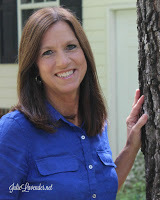 Journalist and author Julie Lavender has already spent countless minutes and hours praying for her new book, 365 Ways to Love Your Child: Turning Little Moments into Lasting Memories, published by Revell, with the initial concept, throughout the writing process, along the publication journey, and for the families who’ll take part in the book’s suggestions when it releases in October. Julie also spent bunches of hours praying for a co-authored book project with Michelle Cox, Be Still and Take A Bubble Bath, published by BroadStreet, that just released this month, along with the companion book, Be Still and Put Your PJs On, authored by Michelle Cox and Sylvia Schroeder. Julie would love to connect with you on social media and on her Group Facebook page, 365 Ways to Love Your Child.
Journalist and author Julie Lavender has already spent countless minutes and hours praying for her new book, 365 Ways to Love Your Child: Turning Little Moments into Lasting Memories, published by Revell, with the initial concept, throughout the writing process, along the publication journey, and for the families who’ll take part in the book’s suggestions when it releases in October. Julie also spent bunches of hours praying for a co-authored book project with Michelle Cox, Be Still and Take A Bubble Bath, published by BroadStreet, that just released this month, along with the companion book, Be Still and Put Your PJs On, authored by Michelle Cox and Sylvia Schroeder. Julie would love to connect with you on social media and on her Group Facebook page, 365 Ways to Love Your Child.
Published on August 12, 2020 22:00
August 11, 2020
Publishing as a Second Language—Vulnerability
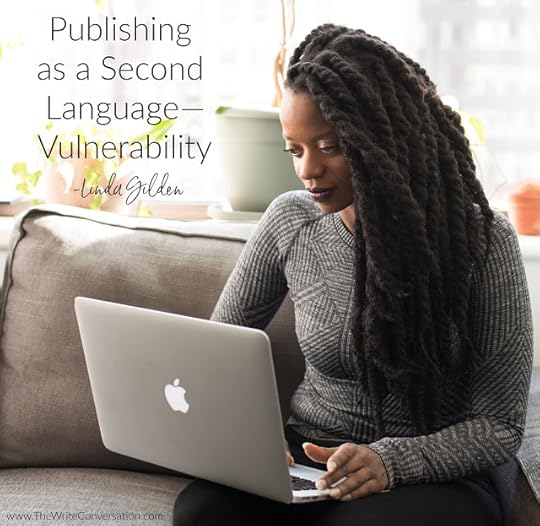
by Linda Gilden @LindaGilden
When I first began writing, my writing was good but probably just in the so-so category. I studied my craft, learned all the rules, and tried to discover exactly what publishers wanted to see come in to their magazines and editorial offices. After a lot of so-so writing, I wanted to dig deeper, study harder, and make my writing stand out. I wanted to touch lives and encourage people to make positive changes.
I discovered there was one critical part of my writing that was missing. Being an extremely private person, I didn’t want people to know exactly how I felt. Wasn’t it enough to tell bits of my story to illustrate a point I was making? Did I really have to peel back the outside layers of my emotions to expose what was deep within?
Bits of my story work fine if I only want to impart information to my readers. But if I truly want to reach their hearts, I must write from the bottom of mine. In order to do that, I learned I must become more open and share my feelings with my readers. I must become vulnerable.
But how could I possibly do that? I didn’t want the world to know my deep dark secrets (although mine were not much different from most people). What would my readers think of me?
I decided to give it a try. A bit reservedly I wrote about my mother’s bout with cardiomyopathy and the difficult decisions we had to make along the way. It would have been much more comfortable to do an easy story about families walking through difficult health issues and give practical tips that may help. But I honestly shared my thoughts and feelings, opening myself up for the reader to see my raw emotion.
What happened? I began to receive mail from others who were walking though similar circumstances thanking me for sharing so openly. I received deeper questions about dealing with the serious illness of a loved one. As I had opened up to my readers, they had opened up to me. My writing had become a ministry to others.
Vulnerability in your writing means you tell the whole truth about what you are feeling. You are honest with your readers, stepping out in courage. You don’t try to cover-up your feelings in order to feel safe. Instead, you want to build a connection with your readers by inviting them in to your world.
If your writing is lacking a spark, or if you feel like you are not reaching your readers, why not step up your vulnerability. Open yourself up a little more in your writing. Not only will your writing become stronger, you will also find your reader connections grow deeper.
TWEETABLE
Publishing as a Second Language—Vulnerability - @LindaGilden on @EdieMelson (Click to Tweet)
 Linda Gilden is an award-winning writer, speaker, editor, certified writing and speaking coach, and personality consultant. Linda is the author of 19 books and over 1000 magazine articles. She enjoys every meeting with editors and knowing we are all part of the same team. Linda’s favorite activity (other than eating folded potato chips) is floating in a pool with a good book surrounded by splashing grandchildren—a great source of writing material! www.lindagilden.com
Linda Gilden is an award-winning writer, speaker, editor, certified writing and speaking coach, and personality consultant. Linda is the author of 19 books and over 1000 magazine articles. She enjoys every meeting with editors and knowing we are all part of the same team. Linda’s favorite activity (other than eating folded potato chips) is floating in a pool with a good book surrounded by splashing grandchildren—a great source of writing material! www.lindagilden.com
Published on August 11, 2020 22:00
August 10, 2020
Learning The Writer's Timeline
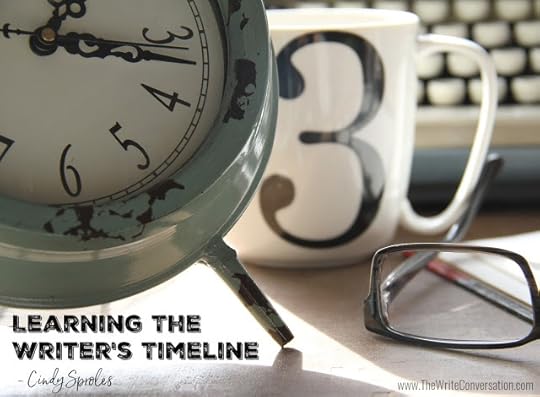
by Cindy K. Sproles @CindyDevoted
My publisher’s editors will tell you, I’m lousy at timelines. It’s become somewhat of a joke with them. A writer friend once told me the sign of a good author was when you could openly admit to your writing weaknesses. I recall asking if she had a couple of hours to listen but I digress.
I’ve sat across the appointment table numerous times as new authors present their novel or non-fiction book. When I ask if their manuscript is complete, they turn pale. That forces me to say, “I need a finished manuscript.” When new writers hear these words, their enthusiasm melts into a puddle of liquid before my eyes and I feel like I have personally destroyed their life’s career.
Fifteen-minute appointments are wonderful. They’re an opportunity for writers to ask questions to industry professionals as well as a prime opportunity to pitch their work. Let’s look at the writer’s timeline. Here are four steps of a writer’s timeline:Learn the craftWrite the manuscriptEdit and polishPitch to an agent or publisher
These items should not be switched, yet I continually hear, “But I can pitch this to an editor or an agent now.” Yes, you can, but my rebuttal is simple. Can you make brownies without an egg?
Let’s Address Our Writer’s Timeline
Steps 1 & 2: Learn the craft and get that manuscript on paper: This is a must. If you’d like to see an industry professional bang their head on the table, tell them you were told you didn’t need to write the book first. Let’s clear this misnomer quickly. If you are a DiAnn Mills, Bob Hostetler, or Steven James who has numerous books already in print, your publisher will look at a proposal and three chapters of an unfinished work and either accept or decline the manuscript based on their current needs because they know you can turn out work that is ready for publication. They already have sales histories and relationships with readers. Rarely, will an industry professional sign a deal on a new author based on a non-fiction outline of chapters and a proposal or a fiction synopsis and three chapters of an unfinished manuscript.
Here’s why. It’s not that you do not have a great idea. The idea may be awesome but industry professionals need to see that an author can write a book from beginning to end. I learned the hard way as a new acquisitions editor. I found a writer with a super story that came to me as a proposal and 3 chapters. The chapters were well done, beautifully executed, so we offered a contract. That’s when the editor contacted me to let me know, the manuscript was a disaster. It didn’t follow any sort of thought process. The help the author wanted to give was lost in the inability to communicate the need. In essence, this author hadn’t mastered the basics. The author probably had help polishing the proposal and tweaking the three chapters necessary to submit. After that, it fell apart. Agents and editors need to see a writer is strong enough in the craft of writing that they can convey to the reader a full understanding of what they are sharing. Learn the craft. Write the manuscript.
Step 3: Edit and polish: There’s little left except doing this. Learn to self-edit. Learn your weaknesses and then find, and if necessary, pay a professional to help you. Is this worth the time and investment? Absolutely. When you present the best work you can, industry professionals take note. It not only shows you care about your work but it strengthens your opportunity to land a contract. When you work in the Christian market, it’s even stronger because God asks of us, “our best.” This skill is vital and being willing to invest time and finances into the effort will pay off.
Step 4: An Agent Cannot Sell what is not Written: Many times authors see an opportunity to pitch a story long before they’ve mastered the craft of writing. We’re excited about our work and after all, we’re sitting in front of an agent. We all need an agent. The truth is, no we don’t need an agent – at least not yet. An agent may love the idea, but unless the idea is on paper and publishable (publishable means the writing is to the level that it is ready for publication), they can do nothing to help you. As my Mamaw used to say, “You got the horse before the cart!” You do not need an agent until you have something for an agent to sell.
The input of an agent or editor at a 15-minute appointment is valuable, especially if you are asking questions about the publishing process or looking at the possibility of an idea to write, but it is unrealistic for an author to think that they will land an agent on an idea or a one-sheet. An agent cannot sell what is not written, so don’t skip learning the craft or writing the manuscript and assume an agent will sign you. When we do this, we set ourselves up for disappointment.
In our excitement, we forget the writer's timeline and the process of how the industry works. I know writers grow excited with their work but the reality of this business is it typically takes several years for an author to receive a contract. I should qualify this by saying, with the introduction of progressive small traditional presses, new authors are receiving contracts sooner than with the larger traditional houses because they are not always required to have an agent. Still, it does not change the timeline. Attend conferences. Schedule 15-minute appointments. Network. But remember the writer’s timeline and don’t set yourself up for disappointment. Good things come to those who wait.
TWEETABLELearning the Writer's Timeline - valuable insight from Cindy Sproles, @CindyDevoted on @EdieMelson (Click to Tweet)
 Cindy K. Sproles is an author, speaker, and conference teacher. She is the cofounder of Christian Devotions Ministries and the executive editor for christiandevotions.us and inspireafire.com. Cindy is the lead managing editor for SonRise Devotionals and also Straight Street Books, both imprints of LPC/Iron Stream Media Publications. She is a mentor with Write Right and the director of the Asheville Chrisitan Writers Conference held each February at the Billy Graham Training Center, the Cove, Asheville, NC. Cindy is a best selling, award winning novelist. Visit Cindy at www.cindysproles.com.
Cindy K. Sproles is an author, speaker, and conference teacher. She is the cofounder of Christian Devotions Ministries and the executive editor for christiandevotions.us and inspireafire.com. Cindy is the lead managing editor for SonRise Devotionals and also Straight Street Books, both imprints of LPC/Iron Stream Media Publications. She is a mentor with Write Right and the director of the Asheville Chrisitan Writers Conference held each February at the Billy Graham Training Center, the Cove, Asheville, NC. Cindy is a best selling, award winning novelist. Visit Cindy at www.cindysproles.com.
Published on August 10, 2020 22:00
August 9, 2020
Speaking Tips for Authors to Switch from Live to Virtual, Part 2
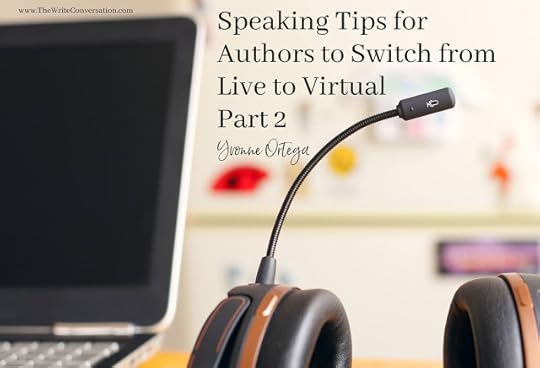
By Yvonne Ortega @YvonneOrtega1
Because I didn’t plan to add a Part 2, the first article doesn’t include Part 1 in the title. However, I attended the first ever Virtual Speak Up Conference July 8–10, 2020. One of my responsibilities was to facilitate virtual prayer sessions and a writers track session. With Plan A in place, I felt ready.
I awakened early to check everything one more time. My equipment functioned without a problem. However, at 8:30 am, the cable company construction crew across the street knocked out internet service in the neighborhood. My lights and appliances continued to work. Therefore, I expected my generator to restore my internet connection.
I called the company that installed the generator to find out if they could send a service technician to my home as soon as possible. The switchboard operator said, “The generator couldn’t restore the internet connection which the construction crew had knocked out.”
So much for Plan A.
Plan B: Search for A Local OptionI moved into Plan B. After thirty minutes of phone calls, I realized because of the pandemic, no coffee shop, restaurant, or public library in my county would allow me to go inside. They all said, “You can sit outside and use your mobile phone to connect to our internet, but you can’t come inside.”
“I have a mask and gloves,” I pleaded. “Remember the temperature is 95° with a humidity that makes it feel like 108°. If I sit in the parking lot with my car air conditioner on all day, the car will overheat.”
“I’m sorry, ma’am. That’s the policy.” Visions of an overheated car chained to a tow truck and my limp body connected to oxygen in an ambulance scared me.
Plan B didn’t work either.
Plan C: Search in Another CityBeads of perspiration formed on my forehead. My heart raced. I shot an arrow prayer to heaven. The answer came: call a colleague in a city twenty-five minutes away. “Yes, come on. We’ll figure out what to do with you when you get here.”
One hour to shower, get dressed, pack already prepared meals, snacks, laptop, extension cord, and paperwork. My colleague allowed me to use an empty office. Upon my arrival, I closed the office door, removed my mask, unpacked, hooked up the laptop, and relaxed for the remainder of the first session.
At the breaks, I put my mask back on, literally ran to the next wing of the office building to use the restroom, and then ran back to the office. My cooler contained lunch and snacks, which I ate with gratitude.
The office lost power at 2:45 pm. The manager assured me that happened once daily. All I had to do was shut down the laptop and start it up again. Meanwhile, my neighbor assured me on the phone that our neighborhood had regained internet service. I packed again, drove home to beat the commuter traffic and thunderstorm in the forecast, unpacked the essentials, and hooked up for the rest of the conference. At least my dinner in the cooler saved me preparation time.
Now, I can laugh about my actual experience the first day of a virtual conference but not then.
To wrap up, when you switch from live to virtual, have more than one plan:Plan A: Check everything twice.Plan B: Search for a local option.Plan C: Search in another city.
What will you do this week to work on Plan B or Plan C?
TWEETABLESpeaking Tips for Authors to Switch from Live to Virtual, Part 2 - @YvonneOrtega1 on @EdieMelson (Click to Tweet)
Don't Miss Part 1!If you missed the first part of Speaking Tips for Authors to Switch from Live to Virtual on Monday, July 13, 2020, you can find it at this link, Speaking Tips for Authors to Switch from Live to Virtual
 Yvonne speaks with honesty and humor as she shares her life and struggles through presentations that empower women to find peace, power, and purpose through God’s Word.
Yvonne speaks with honesty and humor as she shares her life and struggles through presentations that empower women to find peace, power, and purpose through God’s Word. Yvonne’s background as a licensed professional counselor brings a unique perspective into the heart of women. She’s a speaking and writing coach and the owner of Moving from Broken to Beautiful®, LLC. She belongs to the Advanced Writers and Speakers Association, the Christian Authors Network, the National Speakers Association, and Toastmasters International.
She celebrates life at the beach, where she walks, builds sand castles, blows bubbles, and dances.
Published on August 09, 2020 22:00
August 8, 2020
The Need of Sabbath
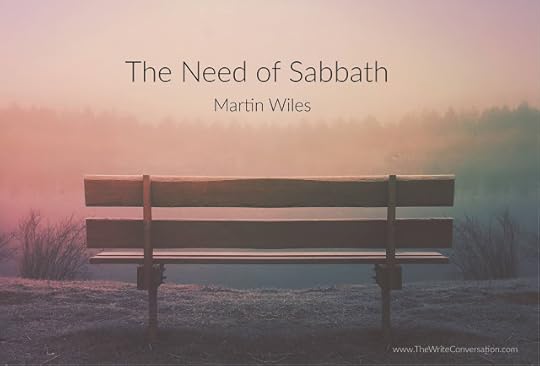
by Martin Wiles @LinesFromGod
I told them the story and watched the confusion lines crisscross their faces.
One thing I love about teaching middle schoolers entails telling them stories about how things were when I was their age—and things differed greatly, especially on Sunday. Growing up in the 1960s and 1970s, I perceived Sunday as a different day. Of course, it would have been for me anyway since my dad pastored churches.
And it wasn’t much else to draw our attention away from attending church, at least in South Carolina. We had Blue Laws, which meant all businesses except the essential ones closed. Gas stations (where someone actually came out and pumped your gas, checked the air in your tires, checked your oil, and cleaned your windshield) opened for travelers, and drug stores opened for those who had medical needs. Other than that, Sunday was a day of rest.
I recall the first time I saw people outside of those essential businesses working on Sunday. I was in my late twenties and had moved to Florida to attend college. As I drove through the small town, I noticed a roofing crew putting a new roof on an apartment building. They looked so strange, perched on a roof on a Sunday.
Now, Sunday is just another day. Most businesses are open, and many people do the same things they do the other six days of the week. We don’t do much resting anymore.
But if God is God and possesses all the traits the Bible assigns Him, why did He need to rest after six days of creating? “On the seventh day God had finished his work of creation, so he rested from all his work” (Genesis 2:2 NLT). Surely, God wasn’t tired. After all, He’s God. Perhaps, He was providing an example.
In Lettie Cowman's book, Springs in the Valley, she tells of a traveler trekking through the deep jungles of Africa. He had engaged Coolies from one of the tribes to help carry his load. On the first day of the journey, they marched fast and traveled far, but on the second morning, the tribesmen refused to move. They simply sat and rested. When the traveler asked why they refused to move, they told him they were waiting for their souls to catch up with their bodies.
Cowman concludes the story by writing, “This whirling rushing life which so many of us live does for us what that first march did for those poor jungle tribesmen. The difference: they knew what they needed to restore life's balance; too often we do not.”
While sleep requirements vary slightly from person to person, studies show most healthy adults need between seven and nine hours of sleep each night to function at their highest capacity. Children and teens need even more sleep. Experts recommend between nine and eleven hours for this group. And while sleep seems harder to come by for some as they age, their need for rest doesn’t diminish. Seniors still need at least seven hours of sleep. When things or health conditions disrupt our sleep patterns, power naps during the day can help fill the gap.
God’s Sabbath reminds us we need down time—time to stop creating. We live in a world where technology gives us endless possibilities to create. And we enjoy the fruits of others’ creations. They make life easier…more enjoyable. But the time comes when we need to step back and sit down—or perhaps lie down. If we don’t, we will hurry on our way to burnout. With burnout, comes breakdown, and when we break down we’re no good to God’s Kingdom work or to anyone else. Breakdown leads to less work and less creativity every time.
God didn’t design our bodies to travel at warp speed seven days a week—regardless of what employers might think. Our bodies require rest, and not just at night. Down time includes periods when we step away from the busyness of life, during the day and for short or extended periods of time. After all, when we’re tired, we’re less creative.
For me, Sabbath means sitting on the patio in our antique glider for short stints each evening and watching the birds come to our feeders. I may read, but I normally just sit, look, and reflect. Sabbath also means taking one day each week to worship my Creator with others of like-minded faith.
God didn’t rest because He was tired. He rested to give us an example of how He created our bodies and souls to work. Find ways to build Sabbath into your life. You’ll be glad you did.
TWEETABLEThe Need of Sabbath - encouragement from Martin Wiles, @LinesFromGod on @EdieMelson (Click to Tweet)
 Martin Wiles is the founder of Love Lines from God (www.lovelinesfromgod.com) and serves as Managing Editor for Christian Devotions, Senior Editor for Inspire a Fire, and Proof Editor for Courier Publishing. He has authored six books and has been published in numerous publications. His most recent book, A Whisper in the Woods: Quiet Escapes in a Busy World, released in December 2019. He is a freelance editor, English teacher, author, and pastor.
Martin Wiles is the founder of Love Lines from God (www.lovelinesfromgod.com) and serves as Managing Editor for Christian Devotions, Senior Editor for Inspire a Fire, and Proof Editor for Courier Publishing. He has authored six books and has been published in numerous publications. His most recent book, A Whisper in the Woods: Quiet Escapes in a Busy World, released in December 2019. He is a freelance editor, English teacher, author, and pastor.
Published on August 08, 2020 22:00
August 7, 2020
How Writing Rescues Us
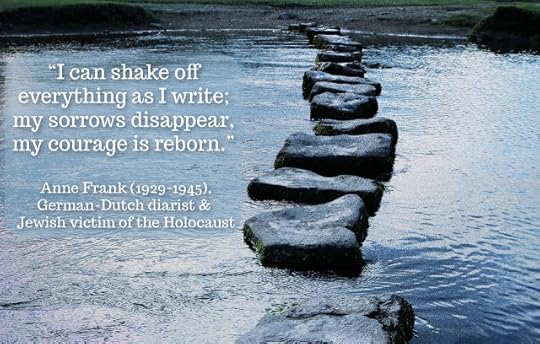
by Beth Vogt @BethVogt
It’s 4:0:5 a.m. here in Colorado as I type this sentence.
I haven’t been to sleep yet.
I tried to go to sleep for all of five minutes. But when I curled up in my recliner, the pain I’d been keeping at bay surged forward and overwhelmed me.
I stayed awake by noshing on Nutella – yes, nibbles of Nutella out of the Costco-size jar – chased by cups of Constant Comment tea, all while cleaning out my email inboxes (plural) and writing blog posts.
And now I’m writing this post because being awake and productive is much better than not sleeping.
A precious friend of mine died earlier this week – someone I love and admire. Someone who treated me with compassion on many occasions.
Even more tragic, my friend committed suicide.
Grief upon grief.
Sometimes as writers, words on the page help us take our first stumbling steps through pain.
I find myself sifting through the harsh reality of this loss with tear-stained words. Recounting memories. Asking questions that have no answers. Uttering prayers that trail off into silence …
I’m so thankful that Jesus intercedes for us when we can’t pray.
Jesus intercedes for us always.
I am, once again, reminded how powerful our words are.
Words allow us to remember those we love as we recall interactions … words spoken … reasons to be grateful when sorrow steals our breath.
Words create stories … and stories intertwine our lives. My story with my friend’s story, no matter how utterly tragic the ending. Even now, I recall the good moments, the reasons I am thankful, thankful, thankful for our friendship.
Writing can be a lifeline from grief – a rescue, if you will, so that we aren’t overcome by sorrow.
We can all help prevent suicide. The Lifeline provides 24/7, free and confidential support for people in distress, prevention and crisis resources for you or your loved ones, and best practices for professionals. 1-800-273-TALK (8255)
TWEETABLEHow Writing Rescues Us - @BethVogt on @EdieMelson (Click to Tweet)
 Beth K. Vogt believes God’s best often waits behind the doors marked “Never.” Having authored nine contemporary romance novels and novellas, The Best We’ve Been, the final book in Beth’s Thatcher Sisters Series with Tyndale House Publishers, releasers May 2020. Other books in the women’s fiction series include Things I Never Told You, which won the 2019 AWSA Award for Contemporary Novel of the Year, and Moments We Forget. Beth is a 2016 Christy Award winner, a 2016 ACFW Carol Award winner, and a 2015 RITA® finalist. An established magazine writer and former editor of the leadership magazine for MOPS International, Beth blogs for Learn How to Write a Novel and The Write Conversation and also enjoys speaking to writers group and mentoring other writers. Visit Beth at bethvogt.com.
Beth K. Vogt believes God’s best often waits behind the doors marked “Never.” Having authored nine contemporary romance novels and novellas, The Best We’ve Been, the final book in Beth’s Thatcher Sisters Series with Tyndale House Publishers, releasers May 2020. Other books in the women’s fiction series include Things I Never Told You, which won the 2019 AWSA Award for Contemporary Novel of the Year, and Moments We Forget. Beth is a 2016 Christy Award winner, a 2016 ACFW Carol Award winner, and a 2015 RITA® finalist. An established magazine writer and former editor of the leadership magazine for MOPS International, Beth blogs for Learn How to Write a Novel and The Write Conversation and also enjoys speaking to writers group and mentoring other writers. Visit Beth at bethvogt.com.
Published on August 07, 2020 22:00
August 6, 2020
Cope with Writing Stress Using These 12 Tips
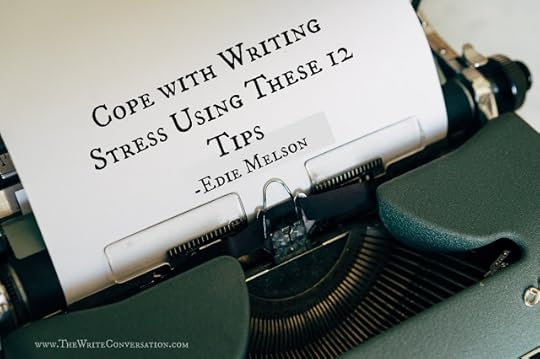
by Edie Melson @EdieMelson
This current life lock-down where we find ourselves can trigger some stress for everyone. I've particularly noticed it in my writing friends. There are other things beyond the world situation that can bring out stress as well and can affect how we move forward. The reasons for the stress are as varied as the writers who suffer. This type of anxiety can be brought on by a series of difficult deadlines, an extended length of time with no forward momentum, exhaustion from a marketing push, or even a series of negative experiences.
The cause isn’t as important as recognizing the symptoms and dealing with them.
1. Take your fears and feelings to God. Begin with prayer, but take it a step further. Journal your prayers and what you feel God is saying to you. When we begin with a connection to the Father, the other things we do to cope are more productive.
2. Stay connected to the present. This is also a kind of non-judgmental mindfulness. Look honestly at your situation and evaluate what's bugging you. Examine and emphasize the differences between truth and lies. Don’t beat yourself up for your feelings, instead study them and acknowledge what you’ve learned and apply that.
3. Start a journal. Give yourself the gift of a place to pour out your feelings. I’ve found that especially for writers, writing down the confusing emotions we’re dealing with brings order. Give yourself permission to be messy. Don’t try to write only once a day in an orderly fashion. Instead write when you feel like it. It may be several times a day or only a few times a week. The important thing is that you have a place to pour out what you’re dealing with.
4. Surround yourself with good smells. Yep, aromatherapy can actually help. Use essential oils, candles, and even soothing lotions. Our mood is affected by the odors around us. Be deliberate about enhancing that part of your environment. I’ve begun lighting a certain candle when I write. Now I’ve got a kind of Pavlov’s Dog situation. When I catch a whiff of that candle, I’m almost instantly in the mood to write.
5. Avoid caffeine, tobacco and alcohol. Yes, we’re writers and we are caffeine-fueled word machines…sometimes. Now is not that time. Instead find a beautiful glass, fill it with sparkling ice cubes, a slice of fruit and fresh water. Hydrate your water-starved body. Need something warm? Choose an herbal tea.
6. Walk away regularly. You may find yourself on a deadline again, but the time you spend on a short walk or another healthy exercise will make you MORE productive. If you’re a knitter, spend an hour with yarn and needles. Pull out your Bible journal or bullet journal and let creativity reign. Whatever renews your spirit is what you need to build into your routine.
7. Find a support group. You are not the only one who has ever experienced this. You are not weak or stupid or defective. Listening to those lies isolates us from the community we desperately need right now. In addition to leaning into God, find His people, open up, and let them support you. When you’re feeling better, you can return the favor.
8. Don’t neglect physical activity. Go for a walk, take a hike, but most of all—work up a sweat. You need those endorphins right now. By getting back into a regular exercise routine you’ll also bring order from chaos.
9. Weed out the unnecessary. Now isn’t the time to add to your work load. Instead look for things you can drop from your regular routine. Cut back on social media, subscribe to a meal service and let that hall closet rest without cleaning it out.
10. Unplug from your electronics. Yes part of being a writer in 2020 is having an active online presence. But this does NOT mean 24-7. Resolve to check your phone only a few times a day. Otherwise, leave it in the other room. Consider even writing old school. Walk away from your computer, pick up a pen and record your ideas on actual paper.
11. Refuse to give in to shame. We have all been where you are. But when we all hide it shame creeps in. Instead be the brave one who admits life can be overwhelmingly stressful. You’ll find freedom in that and release others from their bondage in the process.
12. Prioritize daily and weekly. Every evening I use my bullet journal to make a list for the next day. By recording my to-dos then, I free up my first-thing-in-the-morning for time with God. I also keep a running list for the week so I don’t forget anything vital. I’m developing the habit of NOT looking at my phone or email until after I’ve had some precious time with God. Knowing I already have a list, frees me from the stress of feeling like I’m already behind when I climb into my work-mode.
The biggest thing to remember is that we’re not alone. Being a writer can lead to an incredible life, but it can also bring extreme times of difficulty. With these tips you can begin to recover from the stressful times and help others in the process.
Now it’s your turn. What would you add to my list of ways to cope? Be sure to leave your thoughts in the comment section below.
Don’t forget to join the conversation!Blessings,Edie
TWEETABLECope with Writing Stress Using These 12 Tips - @EdieMelson (Click to Tweet)
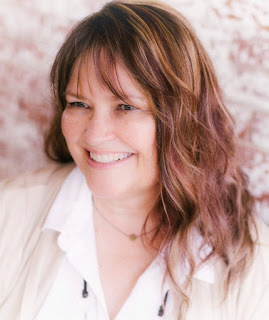 Edie Melson is a woman of faith with ink-stained fingers observing life through the lens of her camera. No matter whether she’s talking to writers, entrepreneurs, or readers, her first advice is always “Find your voice, live your story.” As an author, blogger, and speaker she’s encouraged and challenged audiences across the country and around the world. Her numerous books reflect her passion to help others develop the strength of their God-given gifts and apply them to their lives.Connect with her on her website, through Facebook, Twitter and on Instagram.
Edie Melson is a woman of faith with ink-stained fingers observing life through the lens of her camera. No matter whether she’s talking to writers, entrepreneurs, or readers, her first advice is always “Find your voice, live your story.” As an author, blogger, and speaker she’s encouraged and challenged audiences across the country and around the world. Her numerous books reflect her passion to help others develop the strength of their God-given gifts and apply them to their lives.Connect with her on her website, through Facebook, Twitter and on Instagram.
Published on August 06, 2020 22:00
August 5, 2020
When We Doubt Our Call to Write
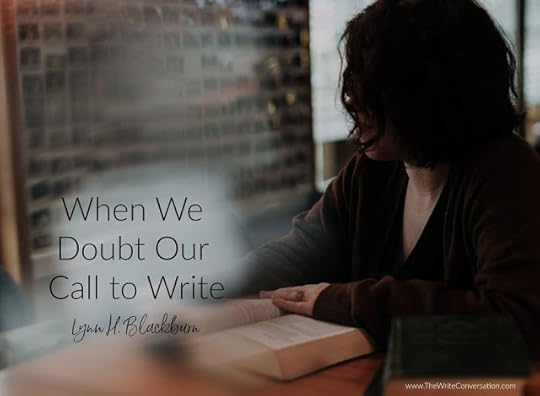
by Lynn H. Blackburn @LynnHBlackburn
I recently returned from a vacation where for three days I didn’t do much of anything but read. It was glorious. I loved the books I brought with me. I inhaled them. I fell in love with the characters and the places and the ideas.And then I found myself with a bit of a problem. Because while the books I read were great, I was forced to contend with one very harsh reality:
There’s no way I could have written them.
In true writer fashion, an impressive neurotic spiral began:
“These books were amazing.”“She’s so talented.”“Where does she get these ideas?”“Her characters are so unique.”“How? How? HOW DID SHE DO THIS?”
and then it kept going ….
“I can’t ever compete with this.”“I’ve never had an original idea in my life.”“What do I have to offer?”“Why do I bother when she does it SO MUCH BETTER?”“What’s the point of me even trying?”
(Please tell me I’m not the only one who does this!)
But, God, (don’t you love that phrase?) had, I believe, ordained that the day after I finished a run of fabulous fiction, I would also be coming to the conclusion of some fabulous nonfiction, and I would read the following:
Who are we to judge whether it’s effective for the kingdom of God? We’re talking about supernatural, eternal life change. Who are we to judge whether our token contribution is meaningful? (Get Out of Your Head ~ Jennie Allen)
Can anyone else say ouch with me?
We all have different temperaments and personalities. You may not struggle with this, but I happen to be the type of person that desperately wants to blend in, except for when I really want to be the.very.best.ever.
The crazy thing is that neither of these extremes are what God has called me to. He hasn’t called me to remain in obscurity. He also hasn’t called me to be #1.
What he has called me to do is faithfully write stories.
My words matter. Not because they are mine or because I’m special or gifted or unique. They matter because they are the words God has given me to help share the Gospel. And it’s not my job to determine their relative importance in the Kingdom.
Will millions of people read them? Probably not.
But what if what I’m writing today is the only thing a starving soul will be willing to read three years from now? How can I not obey the calling on my life and trust God with the results?
Does it matter, in the grand scheme of things, if I win awards or sign another contract or have a book turned into a movie? It only matters if that’s what He wants to spread His Glory and His Fame.
I don’t need my glory and fame spread.
I need to do my best every time, but I don’t need to be the best ever.
If I can wrap my head around that, then I can enjoy and savor the beautiful offerings from my fellow authors without jealousy or envy or fear taking hold.
So, I’m working on my next story and praying God will use it as He sees fit.
I’m thanking God for the gifts He has lavished on my friends and for the joy their stories bring to me and to others.
And I’m praying for grace and endurance to run my race, to tell my stories, to stay on the path God has set my feet on, and that I will mean every word when I pray, “Not to us, O LORD, not to us, but to your name give glory, for the sake of your steadfast love and your faithfulness!” ~ Psalm 115:1 (ESV)
Grace and peace,

TWEETABLEWhen We Doubt Our Call to Write - encouragement from @LynnHBlackburn on @EdieMelson (Click to Tweet)
 Lynn H. Blackburn loves writing suspense because her childhood fantasy was to become a spy, but her grown-up reality is that she's a huge chicken and would have been caught on her first mission. She prefers to live vicariously through her characters and loves putting them into all kinds of terrifying situations while she's sitting at home safe and sound in her pajamas!
Lynn H. Blackburn loves writing suspense because her childhood fantasy was to become a spy, but her grown-up reality is that she's a huge chicken and would have been caught on her first mission. She prefers to live vicariously through her characters and loves putting them into all kinds of terrifying situations while she's sitting at home safe and sound in her pajamas! Her Dive Team Investigations series kicked off in 2018 with Beneath the Surface and In Too Deep (A SIBA Okra pick and Selah Award Finalist). The 3rd book in the series, One Final Breath, released September 2019 and is a 2020 Selah Award and a 2020 Faith Hope, and Love Reader’s Choice Award finalist. She is also the author of Hidden Legacy and Covert Justice, which won the 2016 Carol Award for Short Novel and the 2016 Selah Award for Mystery and Suspense. Lynn lives in South Carolina with her true love and their three children. You can follow her real life happily ever after at LynnHBlackburn.com and @LynnHBlackburn on Bookbub, Facebook, Twitter, Pinterest, and Instagram.
Published on August 05, 2020 22:00



